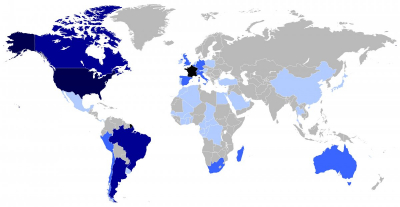The Mississippi River is the second-longest river and chief river of the second-largest drainage system on the North American continent, second only to the Hudson Bay drainage system. From its traditional source of Lake Itasca in northern Minnesota, it flows generally south for 2,340 miles (3,770 km) to the Mississippi River Delta in the Gulf of Mexico. With its many tributaries, the Mississippi's watershed drains all or parts of 32 U.S. states and two Canadian provinces between the Rocky and Appalachian mountains. The main stem is entirely within the United States; the total drainage basin is 1,151,000 sq mi (2,980,000 km2), of which only about one percent is in Canada. The Mississippi ranks as the thirteenth-largest river by discharge in the world. The river either borders or passes through the states of Minnesota, Wisconsin, Iowa, Illinois, Missouri, Kentucky, Tennessee, Arkansas, Mississippi, and Louisiana.Native Americans have lived along the Mississippi River and its tributaries for thousands of years. Most were hunter-gatherers, but some, such as the Mound Builders, formed prolific agricultural and urban civilizations. The arrival of Europeans in the 16th century changed the native way of life as first explorers, then settlers, ventured into the basin in increasing numbers. The river served first as a barrier, forming borders for New Spain, New France, and the early United States, and then as a vital transportation artery and communications link. In the 19th century, during the height of the ideology of manifest destiny, the Mississippi and several western tributaries, most notably the Missouri, formed pathways for the western expansion of the United States.
Formed from thick layers of the river's silt deposits, the Mississippi embayment is one of the most fertile regions of the United States; steamboats were widely used in the 19th and early 20th centuries to ship agricultural and industrial goods. During the American Civil War, the Mississippi's capture by Union forces marked a turning point towards victory, due to the river's strategic importance to the Confederate war effort. Because of the substantial growth of cities and the larger ships and barges that replaced steamboats, the first decades of the 20th century saw the construction of massive engineering works such as levees, locks and dams, often built in combination. A major focus of this work has been to prevent the lower Mississippi from shifting into the channel of the Atchafalaya River and bypassing New Orleans.
Since the 20th century, the Mississippi River has also experienced major pollution and environmental problems most notably elevated nutrient and chemical levels from agricultural runoff, the primary contributor to the Gulf of Mexico dead zone.
The French people (French: Français) are an ethnic group and nation primarily located in Western Europe that share a common French culture, history and language and are identified with the country of France.
The French people, especially the native speakers of langues d'oïl from northern and central France, are primarily the descendants of Gauls (including the Belgae) and Romans (or Gallo-Romans, western European Celtic and Italic peoples), as well as Germanic peoples such as the Franks, the Visigoths, the Suebi and the Burgundians who settled in Gaul from east of the Rhine after the fall of the Roman Empire, as well as various later waves of lower-level irregular migration that have continued to the present day. The Norse also settled in Normandy in the 10th century and contributed significantly to the ancestry of the Normans. Furthermore, regional ethnic minorities also exist within France that have distinct lineages, languages and cultures such as Bretons in Brittany, Occitans in Occitania, Basques in the French Basque Country, Catalans in northern Catalonia, Germans in Alsace and Flemings in French Flanders.France has long been a patchwork of local customs and regional differences, and while most French people still speak the French language as their mother tongue, languages like Norman, Picard, Poitevin-Saintongeais, Franco-Provencal, Occitan, Catalan, Auvergnat, Corsican, Basque, French Flemish, Lorraine Franconian, Alsatian, and Breton remain spoken in their respective regions. Arabic is also widely spoken, arguably the largest minority language in France as of the 21st century (a spot previously held by Breton and Occitan).Modern French society is a melting pot. From the middle of the 19th century, it experienced a high rate of inward migration, mainly consisting of Arab-Berbers, Jews, Sub-Saharan Africans, Chinese, and other peoples from Africa, the Middle East and East Asia, and the government, defining France as an inclusive nation with universal values, advocated assimilation through which immigrants were expected to adhere to French values and cultural norms. Nowadays, while the government has let newcomers retain their distinctive cultures since the mid-1980s and requires from them a mere integration, French citizens still equate their nationality with citizenship as does French law.In addition to mainland France, French people and people of French descent can be found internationally, in overseas departments and territories of France such as the French West Indies (French Caribbean), and in foreign countries with significant French-speaking population groups or not, such as Switzerland (French Swiss), the United States (French Americans), Canada (French Canadians), Argentina (French Argentines), Brazil (French Brazilians), Mexico (French Mexicans), Chile (French Chileans) and Uruguay (French Uruguayans).

 English
English  español
español  français
français  português
português  русский
русский  العربية
العربية  简体中文
简体中文 
